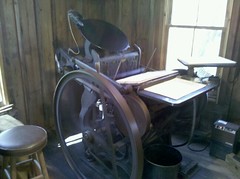 When Gutenberg invented the printing press (1436-1440) one can only imagine what was going through his mind. Most believe that his goal was(beyond making money)to bring down the cost of producing books, making them affordable for the masses and yes, to help increase the distribution of the Bible (the Gutenberg Bible).
When Gutenberg invented the printing press (1436-1440) one can only imagine what was going through his mind. Most believe that his goal was(beyond making money)to bring down the cost of producing books, making them affordable for the masses and yes, to help increase the distribution of the Bible (the Gutenberg Bible).It's hard to believe that he could foresee the consequences of this invention. Firstly reading, once the exclusive domain of nobility and the clergy, was now available to the common man. As the knowledge of how to operate a printing press spread and the price of the equipment declined it led to another evolution - the ability of a handful of people to rapidly print messages for mass distribution and consumption. The deployment of this tactic is well documented in helping spur on and influence the French Revolution 300 years after the introduction of movable type by Gutenberg.
As Internet technologies evolved Sir Tim Berners-Lee had similar goals to Gutenberg when he invented the World Wide Web. In essence it took publishing out of the hands of the few and put it in the hands of the many. Yet it wasn't until the wide adoption of Twitter around the world that we can truly see history repeating itself. Twitter as a technology allows anyone to post a message of 140 characters and have it distributed to the world in a matter of seconds. You don't have to be a friend or fan as in Facebook. You don't have to monitor a website for details; you just need to follow a person or a hash tag or monitor it for a specific phrase.
With this power available to so many, no wonder countries faced with uprisings and revolution are now trying to shut down Internet access in its entirety and not just block specific websites. Yet the powerful backbone of the Internet TCP/IP as we saw in Egypt earlier this month allows applications like Twitter to function beyond the confines of political borders and actually accelerate the speed of the revolution as the printed word did for the French Revolution.
So is Twitter the reincarnation of Gutenberg's printing press? Perhaps not the technology or the application of it, but most certainly its use. Ultimately the use of the printed word to stimulate and spread the word of revolution isn't an original idea, but modern technology like Twitter can make revolutions happen faster.
No comments:
Post a Comment